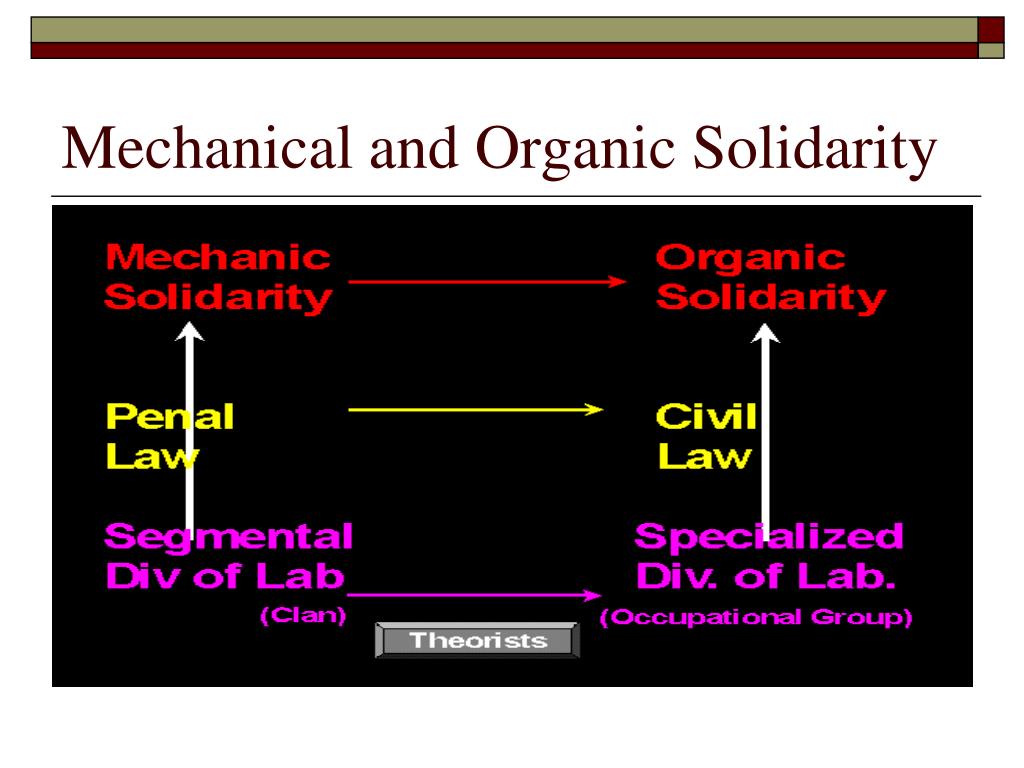Imagine a bustling city street. People from diverse backgrounds, cultures, and beliefs converge, each with their own unique story, purpose, and rhythm. What keeps this seemingly chaotic symphony of humanity in harmony? What binds these individuals together in a shared sense of belonging? The answer lies in the invisible forces of social cohesion, known as mechanical and organic solidarity. These concepts, first articulated by the groundbreaking sociologist Émile Durkheim, offer a profound insight into how societies function and how their members interact.

Image: www.slideserve.com
Durkheim’s theory of social solidarity, presented in his seminal work The Division of Labor in Society, is a foundational pillar in sociology. It explores the different ways in which individuals connect and cooperate within a society. Understanding these principles allows us to grasp the evolving nature of social structures and the forces that shape our shared experiences.
The Strength of Shared Beliefs: Delving into Mechanical Solidarity
Imagine a small, rural community where tradition reigns supreme. People live closely together, sharing similar values, beliefs, and practices. Their lives revolve around collective rituals, festivals, and shared agricultural practices. This sense of shared identity and collective purpose fuels a strong feeling of unity, known as mechanical solidarity.
Mechanical solidarity, rooted in likeness, is a primal force that binds individuals together through shared beliefs, customs, and practices. It thrives in simple, homogeneous societies where individuals perform similar tasks and roles. Think of a traditional hunting tribe where everyone shares a common objective, relying on each other’s knowledge and skills for survival. In these societies, individuals are tightly integrated into the collective whole, as their roles and responsibilities are inextricably bound to the group’s survival.
Here are some key characteristics of mechanical solidarity:
- Strong Collective Consciousness: A shared sense of values, beliefs, and norms that guide individual behavior.
- Limited Individuality: Emphasis on group conformity and adherence to traditional norms.
- Punishment as Repressive: Severe punishments for violating collective norms to maintain social order.
- Simple Division of Labor: Individuals perform similar tasks, minimizing specialization.
- Similarities in Beliefs and Practices: Fosters strong social bonds and a sense of shared destiny.
The collective consciousness acts as a powerful unifying force, promoting social cohesion and guiding individuals’ actions. Deviating from this shared morality is often met with strong social sanctions, ensuring conformity and the preservation of collective norms.
The Interconnectedness of Specialized Roles: Exploring Organic Solidarity
As societies evolve and become more complex, the nature of social solidarity transforms. Modern society, characterized by specialization and interdependence, relies heavily on organic solidarity. This form of solidarity arises from the division of labor and the interconnectedness of specialized roles. Imagine a bustling city with diverse occupations, each contributing to the smooth functioning of the whole. The interconnectedness of these specialized roles, like pieces of a complex puzzle, creates a web of interdependence that binds individuals together.
Organic solidarity, rooted in differentiation, flourishes in societies where individuals hold diverse roles and contribute unique skills to the collective good. Think of a modern city with its intricate network of professions, from doctors and teachers to engineers and entrepreneurs. Each individual plays a vital role, contributing their specialized expertise to the functioning of the whole. This interconnectedness fosters a sense of reliance and mutual dependence, forming the basis of organic solidarity.
Here are some key characteristics of organic solidarity:
- Differentiation and Specialization: Individuals specialize in specific tasks and roles, fostering interdependence.
- Emphasis on Individualism: Value placed on individual talents, skills, and contributions.
- Legalistic Punishment: Emphasis on restorative justice and rehabilitation instead of harsh punishments.
- Complex Division of Labor: Individuals rely on each other for specialized goods and services.
- Diversity in Beliefs and Practices: Fosters social complexity and requires mechanisms for conflict resolution.
In societies with organic solidarity, the collective consciousness becomes less powerful, allowing for greater individual expression and a more diverse range of values. As individuals become more specialized, their dependence on others increases, fostering a sense of interdependence and solidarity.
Bridging the Divide: Embracing the Benefits of Both Types of Solidarity
While seemingly distinct, mechanical and organic solidarity are not mutually exclusive. In fact, most societies exhibit a blend of both. Think of a community where traditional values are interwoven with modern, specialized roles. This blend of shared beliefs and interdependence creates a unique and dynamic social fabric.
Understanding these principles allows us to recognize the strengths and limitations of different types of societies. Mechanical solidarity provides stability and cohesion in simpler communities, fostering a strong sense of belonging. Organic solidarity, on the other hand, enables innovation, progress, and the development of complex social structures. Recognizing this dynamic interplay between these two forms of solidarity is essential for navigating the complexities of modern life and understanding the forces that shape our social interactions.

Image: www.scribd.com
Guiding Principles for Strengthening Social Bonds
While the nature of solidarity may evolve over time, the fundamental principles remain relevant. Here are some practical insights for fostering stronger social bonds in our increasingly complex world:
- Celebrate Shared Values: Emphasize common ground and values that unite us as a society, fostering a sense of belonging and collective purpose.
- Promote Interdependence: Encourage collaboration, participation, and recognition of the unique contributions of each individual to the collective good.
- Cultivate Empathy and Understanding: Foster an environment of respect and openness where diverse perspectives are valued and differences are embraced.
- Invest in Social Institutions: Support organizations and institutions that promote community engagement, social justice, and mutual support.
Mechanical And Organic Solidarity
A Call to Action: Strengthening the Fabric of Our Societies
The journey towards a more just and sustainable society requires a concerted effort to strengthen the fabric of our communities. By embracing the principles of mechanical and organic solidarity, we can create a future where social bonds are strong, diversity is celebrated, and everyone has the opportunity to thrive.
Let’s engage in thoughtful conversations, foster empathy, and actively participate in building a world where the invisible threads of solidarity connect us all.






